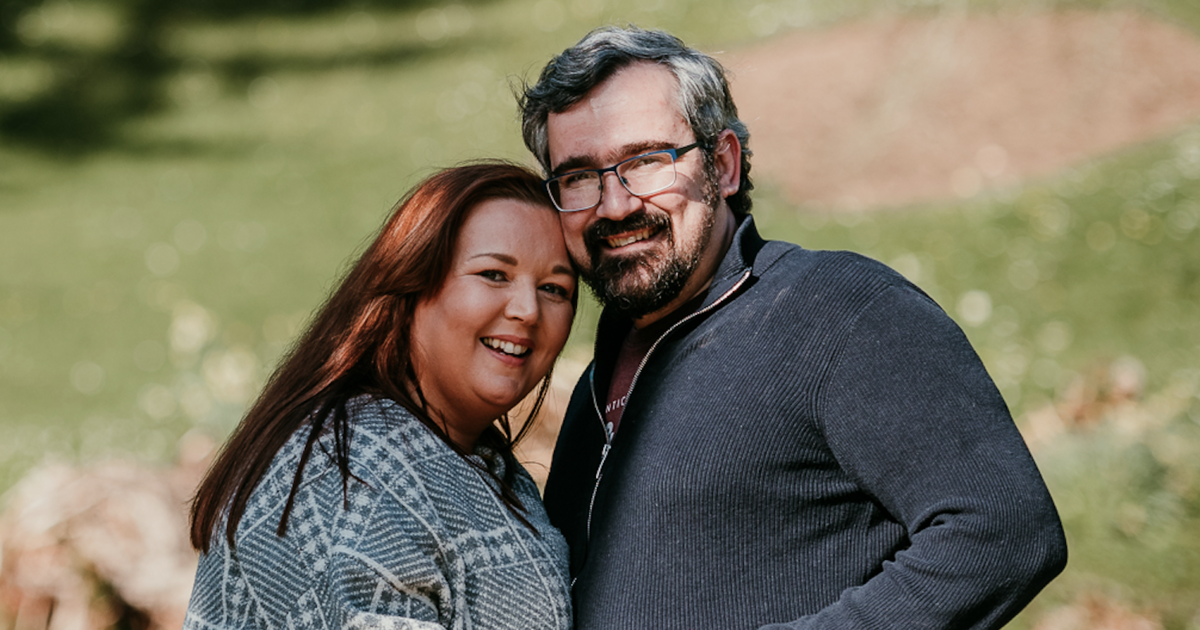Covid restrictions and unseasonal snow may have threatened to derail Stefan and Sile Tankov’s wedding day, but the pair were determined to marry in April 2021 no matter what. “It was a brilliant day,” says Sile, a secondary school teacher from Lisburn near Belfast who met her future husband on a night out in 2019.
“We thought about postponing but decided, no, that’s the date we want to get married. There were 15 guests and people came to our house in pairs to say congratulations as it was too cold to be in the garden. We were happy in our bubble, everything seemed to be right, but in two years it all started falling apart.”
In September 2022, Sile, now 42, began noticing changes in Stefan’s personality. “He was a very emotional person and I noticed that element not being there quite as much.
“He stopped asking how my day was, instead asking what’s for dinner, which had to be at 5pm. As soon as he’d eaten, he’d go to bed. Once, I was in hospital and tried to explain how to visit on the bus. It wasn’t complicated but he just couldn’t figure it out.
“Stefan worked as a temp and began having trouble keeping a job. He became withdrawn and repeatedly forgot if I asked him to do something, then couldn’t understand if I got annoyed.” Sile thought perhaps Stefan, now 40, was depressed. Their GP agreed. Tests also discovered Stefan had type-2 diabetes. “We thought it may have been causing confusion but he didn’t improve,” says Sile.
“Halfway through one doctor’s appointment, he got up and left. I had to bribe him with a McDonald’s to come back. It was like dealing with a child.”
The situation came to a head in April 2023 during a trip to a local shop. “I could see the staff getting into a bit of a flurry then one came over and said, ‘You can’t be in here. You’re barred’.
“I asked what was going on, she said he’d repeatedly tried to steal bottles of wine. I was absolutely mortified.” Sile phoned her mum in tears and called her brother, who rushed straight over. “As soon as he saw Stefan, he knew there was something going on.”
The family decided to take Stefan to hospital where tests revealed his cognitive function was “very low”. Doctors ordered MRI and CT scans with a full psychological report.
For the next four weeks, Sile cared for Stefan at home. “One morning I found him about to put his hands on the hob, which was bright red, to see if it was warm. He’d wander off, walk in front of cars and stare at people. We stopped going out. He started vaping and was incontinent. There was so much laundry.”
Sile was hardly sleeping, waking Stefan every hour to go to the bathroom. “I don’t know how I coped. I was lucky I could take time off work, but needed to go back or we’d have no money.”
Sile took Stefan back to hospital. Following CT and MRI scans and a lumbar puncture, he was given the devastating diagnosis of frontotemporal dementia. Doctors said he wouldn’t be able to return home. “I was in complete shock. Everything had been lovely – we were hoping to have a family.”
Dr Tim Beanland, Alzheimer’s Society’s Head of Knowledge and Learning, says: “Dementia is the UK’s biggest killer, affecting around one million people in the country. It is estimated that over 70,000 people are living with young-onset dementia, where symptoms start before age 65. They tend to experience a particularly wide range of symptoms, especially in the early stages.”
After a stint in one care home, Stefan was moved back to hospital, where he stayed for 11 months, with Sile only able to book hour-long visitation slots. “I never even saw his room. I found that very tough. “I’d be dealing with calls during the work day from social workers, consultants, psychologists and nurses because he’d fallen, or asking me to take back his wedding ring because he’d started hitting everything, which is a sensory issue, and they were worried he’d smash a window.”
Stefan finally moved into a “wonderful” new care home in July, but things are still tough. “You don’t expect to find yourself buying soft toys for newborns because your 40-year-old husband has started chewing the teddy bears he needs to get to sleep and you’re worried he could choke.
“I know the direction we’re going in and nothing’s going to change that. In May we were told if he’s still here in six months to a year, we’ll be doing well. The changes are coming quickly. He’s stopped getting out of bed now, which is hard.
“It can be isolating – other people are visiting parents and grandparents, I’m visiting my husband. Sometimes I sit in the car and cry. But my family, friends, colleagues and neighbours have been supportive. I’ve had wonderful support from the Alzheimer’s Society, Admiral Nurses and eight weeks counselling with Rare Dementia Support.
“He’s happy in the home and I love being there with him, even if it’s just to get into the bed beside him and give him a hug. There are little signs that make it all worth it, like when he sings along to a song my brother wrote, or gives my hand a squeeze. If I say I love you, he’ll say, ‘I love you so much’.
“When I look back, those happy moments are the memories I want to have.”
The Alzheimer’s Society is asking people to share stories at alzheimers.org.uk/stories to bring dementia into the open and make it a political priority









